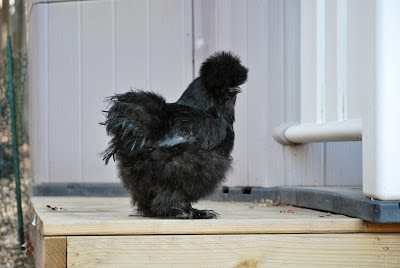Wry neck is a condition where the chickens neck is twisted. It's also called crook neck, twisted neck or stargazing. Some time the chick's neck twists up so it looks like their looking at the sky, others are backwards and still others are sideways like the little guy in the picture above.
What causes wry neck?
There are several different beliefs on why chicks get wry neck. Some say it's strictly a vitamin deficiency, other say its certain breeds (Silkies and Polish) and then there is also a genetic link. I've found that it's often a combination of these factors.
Yes, my Silkie chicks got it more than any other breed I have. However, I have fixed it with supplements. I've also found (as with the chick in the picture) that if a chick outgrows wry neck, their offspring are more likely to get it. Confused yet?
It's certainly not a cut and dried answer, but it's the only one there is! It should also be mentioned that I have also dealt with wry neck in adult chickens, not just young chicks. More on that a little further down the article.
Now, let's get back to my chicks getting wry neck. The first time it happened I just accepted it as a sometimes silkie thing. The next one clicked the light bulb on in my head. Genetics! Sure enough once I moved her mama hen to the grow out pen and ran through the current incubation cycle, the wry neck chicks stopped. Problem solved.
All of those chicks hatched with wry neck had been from this mama hen.
Treating Wry Neck In Chicks
This silkie hen was hatched last year from a reputable breeder (who shall remain unnamed) to add to our breeding stock. At about 3 weeks old she developed wry neck. I got her through it with vitamin E and selenium three times daily and neck massages.I bought the Vitamin E with selenium capsules and pierced them open with a pin, squeezing a few drops into her mouth each time. I did that 3 times a day. I also lightly massaged the muscles of her neck focusing more on the side that seemed cramped, not the stretched side.
The chick quit getting worse as soon as I started treatment. It probably took about a week to tell she was getting better though. Another 2 weeks and you could barely tell she had wry neck at all. Success! This treatment also works in adult chickens with wry neck.
Treatment for adult chickens with wry neck
The treatment is the same for adult chickens with wry neck except you'll give them the whole capsule dripped into their mouth 3 times a day. Lightly massage the neck muscles for a few minutes each time as mentioned above.
You can add foods high in selenium to their diet to keep from having a recurrence or if you know they are prone to wry neck. Egg yolks are pretty high in selenium as are sunflower seeds, cashews, brown rice and meats like turkey, beef and chicken.
Brazil nuts are one of the highest foods in selenium, but they require some prep work to feed them to your chickens...and they're probably the most expensive food on this list. I use a nut chopper to chop up brazil nuts and put a some in the feeder with their feed pellets.
During treatment for wry neck I like to give the baby or adult chicken cooked egg yolk every day in addition to the vitamin e & selenium treatment. Not only does it have the selenium they need but egg yolk is high in calories with extra protein and fats that they need...especially if they're not eating well because of the wry neck.
Here's an adult Silkie chicken with wry neck. As you can see her neck is bent and twisted so her eye is looking up at us.
Even when you successfully treat many chickens with wry neck, there is still the genetic issue to contend with. Even though the black Silkie hen mentioned earlier is healed and is now an adult, she passed this problem on to her offspring.
Only some of her chicks have problems with wry neck, but it's better to just remove a hen from the breeding group rather then take the chance of wry neck in her chicks.Sadly, not all chicks make it through wry neck even with treatment.
This pretty black hen now resides in the grow out pen with the teenager silkies. She's looking for a 'laying hen' home with full disclosure of her ailments. She's fluffed out a bit since that first picture was taken of her as a pullet.
She's a pretty girl, a sweetheart and might even be able to be shown....but never used as a breeder! Lesson learned!
~L
Want information on raising chickens sent right to your email weekly? Click right here to join my list and get new posts sent directly to you the day they're published. You'll also get the free download 25 Ways to save money raising chickens.
I am not a veterinarian or other animal care professional nor do I claim to be. I am simply passing on information that has worked for me and my flock. This information is for entertainment purposes only and is not meant to treat or diagnose any medical condition. Please see a vet if your chicken is ill. Click for my full disclaimer.
This post contains affiliate links. If you chose to purchase something through the link, I will get a small payment from Amazon. It will not affect your purchase price. Click for full disclosure.







Thank you so much for linking up! You were our featured blogger this week! Congrats~Melissa
ReplyDeleteThank you so much! Heading over there now!
Delete~L
Oh I had no idea that this condition existed. Nice of you to retire her from the breeding stock but did you manage to help her offspring overcome their wry necks?
ReplyDeleteOne of her babies responded well to treatment but unfortunately the other one didn't. We haven't had any more chicks hatch with wry neck since though.
Delete~L
I have never heard of this before and I am not sure whether we get this in Australia or not but I really appreciate you sharing it with us at Good Morning Mondays. Blessings
ReplyDeleteThanks for adding this to From The Farm...it's easy to see why this is one of this week's favorites!
ReplyDeleteI do not comment, however after browsing a few of the
ReplyDeleteremarks here "What to do about wry neck in chicks". I actually do have
some questions for you if it's allright. Is it only me or do a
few of the comments look as if they are coming from brain dead folks?
:-P And, if you are posting on additional online sites, I'd like to keep up with anything fresh
you have to post. Would you make a list of the complete urls of all your social community sites like your Facebook page, twitter feed, or linkedin profile?
LOL....I used to add my posts to a lot of group link-ups, so many of the comments are from those and they don't make much sense if you don't know where it's from!
DeleteAll of my social sites links are at the bottom of my newsletter which is sent out weekly. There is a sign up at the end of every post.
I live in Victoria Australia and have had one chick ( a cross Barnavelder Orpington )with wry neck which died a day after birth this is the only one i have seen and i breed a lot of chicks a year.
ReplyDelete